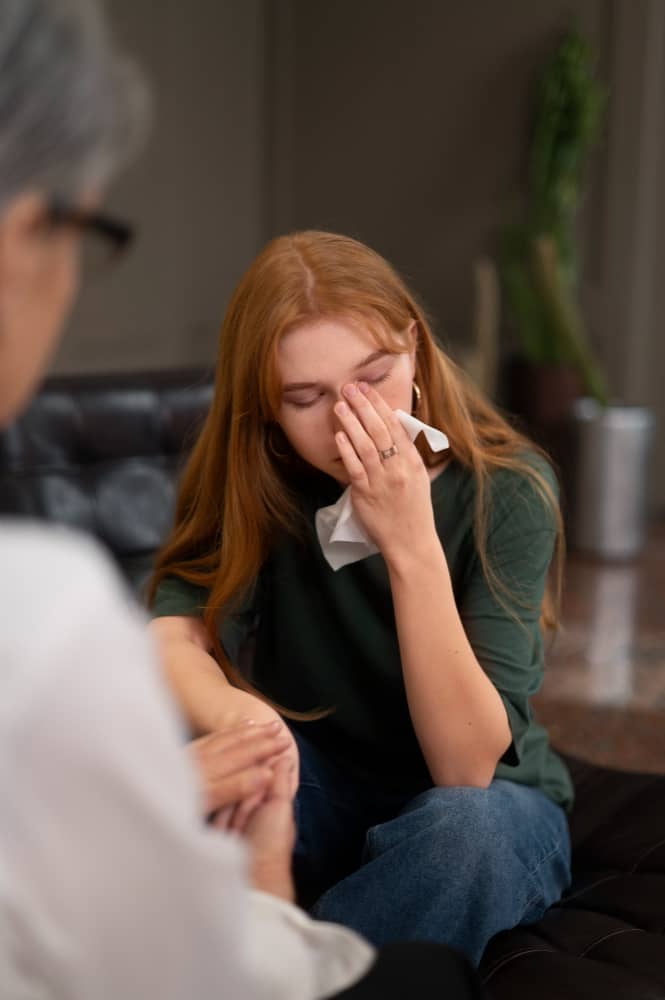Areas of focus

Anxiety disorders also affect people’s thoughts, perceptions, and interpretations of their environment and interactions. People with anxiety disorders may pay special attention to situations that confirm their anxious thoughts. Anxiety disorders may contribute to a person’s distorted sense of self and have an inability to control critical thoughts of themselves and others. Distorted perceptions such as these often heightens anxiety and worrisome behaviors.
Anxiety disorders are the most common mental illness in the United States, affecting 40 million adults (19.1% of the adult population). Some categories of anxiety disorders are Generalized Anxiety Disorder (GAD), Panic Disorder (PD), and Social Anxiety Disorder (SAD). Anxiety disorders affect 31.9% of adolescents between 13 and 18 years old. Research shows that untreated teenagers with anxiety disorders are at higher risk to perform poorly in school, miss out on important social experiences, and engage in substance abuse.


Prescription medications can also be useful in the treatment of anxiety disorders. Medication can be a short-term or long-term treatment option, depending on how severe an individual’s symptoms are and how he or she responds to treatment. Selective serotonin reuptake inhibitors (SSRIs) are currently the medications of choice for the treatment of childhood and adult anxiety disorders.


Depression is one of the most prevalent mental health conditions in the US and it is the leading cause of disability worldwide. In 2020, an estimated 14.8 million U.S. adults aged 18 or older had at least one major depressive episode with severe impairment in the past year. Rates of depression are higher among young adults between the ages of 18 and 29 and an estimated 4.1 million adolescents aged 12 to 17 in the United States had at least one major depressive episode.

Prescription medication can relieve depressive symptoms. A combination of medication and psychotherapy has been associated with significantly higher rates of improvement in more severe, chronic, and complex presentations of depression. Antidepressants are an effective treatment for depression. Antidepressants usually take some time (2 to 4 weeks) before they impact the symptoms. Appetite, sleep and concentration typically improve before mood begins to lift.

- Excessive pursuit of rewards or perceived rewards despite negative consequences, such as spending sprees, excessive risk taking and hypersexuality.
- Excessively high, euphoric, or elevated mood or, concurrently or alternatively, extreme irritability or mood lability.
- Increased energy, activity, and restlessness.
- Racing thoughts and talking very fast, jumping from one idea to another Distractibility, inability to concentrate.
- Decreased need for sleep (the belief that sleep is not necessary).
- Unrealistic beliefs in one's abilities or importance.
Bipolar disorder affects up to 3% of the US population. Additionally, bipolar disorder is recognized as one of the top 10 most disabling conditions in developed countries worldwide. The suicide rate in bipolar disorder is among the highest of any medical and psychiatric condition, perhaps as high as 10-15% of affected individuals. Bipolar disorder is genetic, with about an 85% risk of developing this disorder.


Treating and diagnosing bipolar disorder is complex and may require psychotherapy and psychopharmacology to receive the best outcomes. Prescriptive medication treatment may consist of various mood stabilizing/anti-manic drugs including lithium, divalproex sodium, several second-generation antipsychotics and several anti-epileptics. Although bipolar disorder may be a life-long disorder, there are various treatment options with great outcomes to improve a person’s quality of life.


There are about 12 million people in the US living with PTSD. The National Center for PTSD found that about 6 out of 10 men (or 60%) and 5 out of 10 women (or 50%) experience at least one trauma in their lives. For adolescent and teenage girls, 15% to 43% of them have experienced at least one traumatic event in their lives. For adolescent and teenage boys, 14% to 43% have experienced at least one traumatic event in their life. PTSD may go untreated in adults and children due to traumatic events not being recognized or reported.

Exposure Therapy (ET), an intervention that helps people face and control their fears by exposing them to the traumatic memory they experienced in the context of a safe environment. The goal of this therapy is to gradually expose the individual to the trauma so that the individual becomes less sensitive to it over time.



